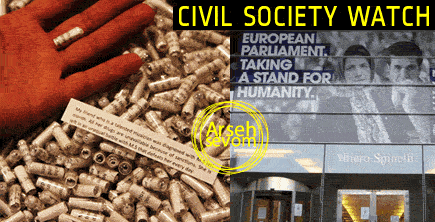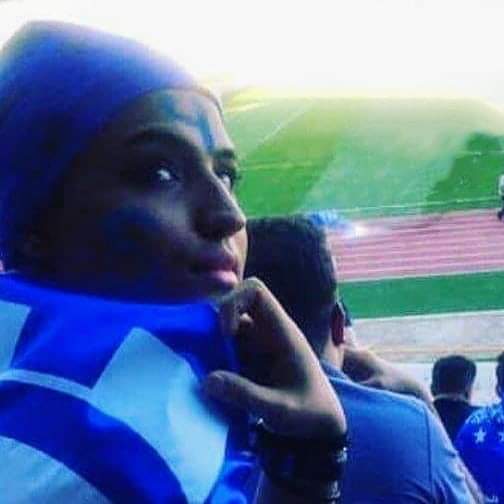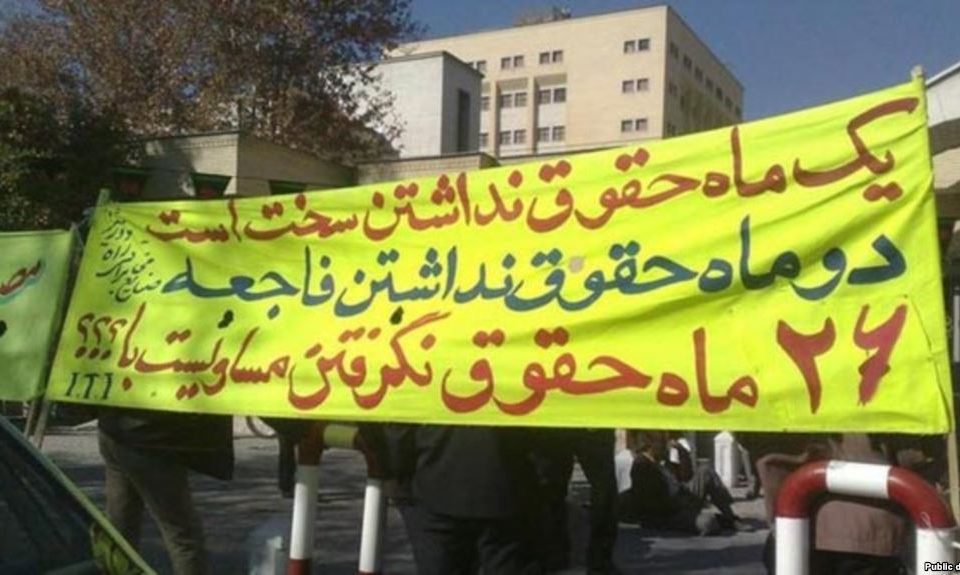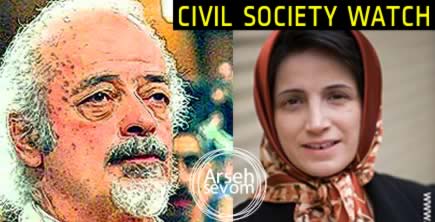
Iran: Sotoudeh Ends Hunger Strike, Maleki Calls for an End to Bad Rule
December 5, 2012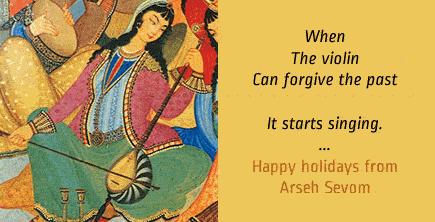
Happy Holidays
December 20, 2012Some in Iran are feeling the effects of shortages of medicine and high prices more than others while an artist challenges passersby at the UN to confront the effects. Nassrin Sotoudeh and Jafar Panahi receive the prestigious Sakharov Prize via proxy, calling for justice and freedom. Mohammad Maleki is called to serve a six-year prison term, the Supreme Leader gets a Facebook page, and journalists call for an end to the intimidation of family members by interrogators. Parliament debates election reform and reduced power for the president and imprisoned human rights activists call for others to spread the message of human dignity. Human Rights Watch issues a report on the more than 40,000 Iranians seeking asylum abroad while a photographer shows us that life in Iran goes on…
Crippling Sanctions Continue
Stories of the suffering of people in Iran as a result of a shortage of medicine or high prices due to crippling sanctions are commonplace. Although one cannot only blame the sanctions — the government’s mismanagement of the health sector and medical provisions also needs to be taken into consideration — victims of such policies are mounting on a daily basis. Sick children in poor families are among the most vulnerable and their lives are threatened. The Society for Protecting the Rights of the Child recently released a statement [fa] voicing concern about the situation of this vulnerable group and called for lifting sanctions from medical supplies, urging relevant officials to take better protective measures to support this group, and urging physicians and ordinary citizens to do anything in their power to protect these children from more pain and suffering.

In collaboration with Havaar and Sanctioned Life, Iranian artist Sanaz Sohrabi performed her piece “Sanctions; Silent War” in front of UN headquarters in New York. She filled thousands of pill capsules with the real-life stories of Iranian patients whose lives have been affected by sanctions. She gave the capsules to people passing by, asking them to open the capsule and read the message inside. The aim of the piece was to deliver the message that sanctions are holding the health of the Iranian people hostage, especially that of children, women, chronically ill patients, and the elderly.
Sotoudeh’s Dream: Realization of Justice
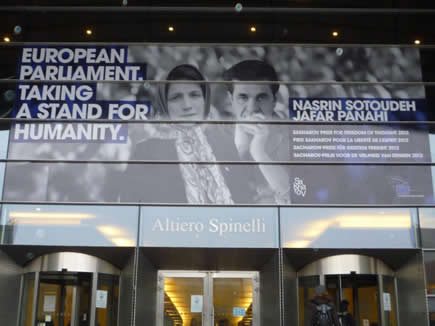
By awarding the Sakharov Prize to two Iranian activists, lawyer Nasrin Sotoudeh and film director Jafar Panahi in absentia, the European Parliament acknowledged their plight and their outstanding efforts in their incessant struggle for human dignity, fundamental freedoms and political change in Iran, last Wednesday. In their acceptance speeches, delivered by their representatives Nobel laureate Dr Shirin Ebadi and the filmmaker Mr Costa-Gavras, the laureates expressed their gratitude for the prize as a symbol of encouragement.
Panahi dedicated the prize to “all the anonymous fighters for freedom, to all those who are fighting for peace in the whole world.” In her thank-you letter, Sotoudeh dedicated the prize to “all the political prisoners of Iran and the world.”
“I have only one dream; the dream of the realization of justice and I believe that this dream will be realized in my country, by juridical independence,” said Nasrin Sotoudeh in the speech delivered by Nobel Prize laureate Shirin Ebadi. “Governments should know that in order to maintain their existence, they have no choice but to observe the rights of every individual,” she added.
This obviously was followed by a negative reaction from Iran’s Foreign Ministry on Sunday. Its spokesman said: “Unfortunately, the European Union and its affiliated bodies have a selective approach to and objectify [sic] human rights matters, and pursue their political objectives by raising such issues.” Mr. Mehmanparast failed to provide any information on the whereabouts of the two individuals in question though.
Footprints of Intelligence Ministry and Hawza in Reforms on By-laws for Political Parties
The Iranian parliament has been debating on amendment to its election laws over the past two weeks. The aim of the changes, proposed by nearly one-third of Iran’s members of parliament, is twofold: to 1) give parliament increased power in Iran’s cumbersome presidential vetting process while 2) reducing the role of the executive branch in elections.
This bill has created heated discussions among intellectuals and lawmakers. There is debate about whether it will be passed in time to be implemented in the upcoming presidential election or not.
Amid all discussion on election laws, the Domestic Policy and Councils Commission of the parliament has taken up the reform of executive by-laws related to Political Parties. Jahan e Sanat [fa] presented a comprehensive report on proceedings for the bill, highlighting the influences of the Intelligence Ministry and Hawza (Islamic seminary) in reforms proposed to laws that apply to political parties.
Dr. Maleki Summoned to Evin Prison
Dr. Mohammed Maleki, the former Chancellor of Tehran University, wrote an open letter to the Supreme Leader in November 2012 urging Ayatollah Khamenei “to accept that Iran is at the verge of collapse.” He urged Khamenei’s resignation and a free and fair referendum about the state of the country. Maleki was summoned to Evin Prison last Tuesday to serve the six-years prison sentence imposed on him earlier.
Get Up, Stand Up: Stand Up for Your Rights…
Six Iranian human rights activists behind bars issued a statement calling for greater resistance to rights abuse and the condemnation of Iran’s widespread use of the death penalty. Their statement calls upon all activists to put in “greater effort to spread an understanding of human rights and the protection of human dignity in society.”
The head of judiciary received a letter from 117 journalists calling for protection for the imprisoned journalist Alireza Rajaei’s family from “threats, harassment, and violence.”
The journalists referred to a letter from another political prrisoner Abolfazl Ghadiani describing the unethical intimidation by interrogators towards relatives and families of political prisoners and naming the interrogator of Alireza Rejai. The Iranian security apparatus has a history of arresting family members to put pressures on the prisoners.
International Migration Day and Iranian Activists in Exile
December 18 marks International Migration Day. Human Rights Watch [HRW] released a report [en] on December 14 noting the increasing numbers of Iranian activists fleeing the country in the three years since the disputed 2009 presidential election.
The 60-page report “Why They Left: Stories of Iranian Activists in Exile” documents the experiences of dozens of rights defenders, journalists and bloggers, and lawyers targeted by security and intelligence forces because they spoke out against the government. The report concludes that due to the crackdown against popular dissent by security and intelligence forces the “space in Iran for civil society has been shrinking” since 2009. According to its findings, close to 45,000 Iranians sought asylum in 44 countries over the period of 2009 to 2011.
Supreme Leader and the [Filtered] Social Media

Although social media websites are blocked in Iran, Ayatollah Ali Khamenei has launched his own page on Facebook. According to the Guardian [en], the news came from Khamenei’s Twitter account, believed to be run by his office. Khamenei’s official website has not yet confirmed the existence of the page, but Baztab, a conservative news website, said the account was run by his office.
It is worth mentioning that his office has already been active on Twitter and Instagram despite the fact that most social networking websites are filtered in Iran and are considered instances of the so-called “western soft-war.” Will the leader’s face end up in an advertisement as a result of his use of Instagram? Only time will tell.
Brandon Stanton, a New Yorker, started a documentary project to create a photographic census of nearly every New Yorker a while ago. The project, Humans of New York, has been very successful online, with an active blog, and an even more active Facebook page. Brandon, the photographer behind the Humans of New York website, is currently in Iran and has been posting images from there. This is a different, yet interesting portrayal of Iran amid all the negative news we hear everyday.


